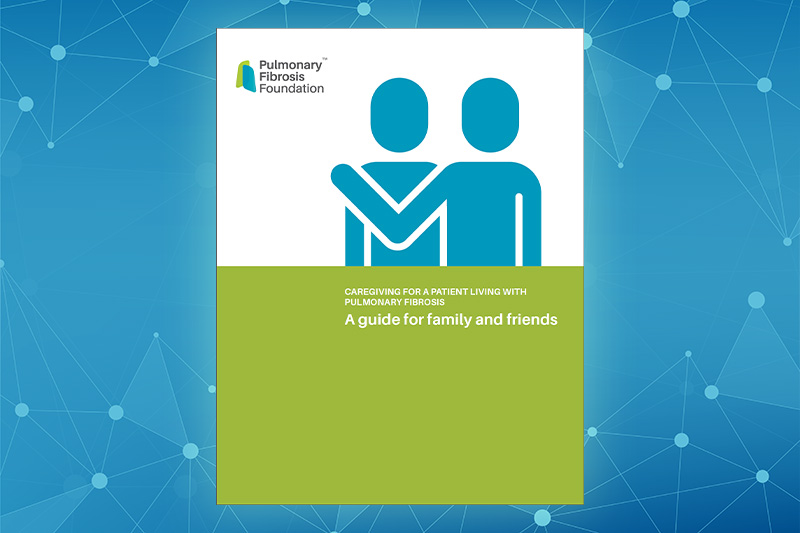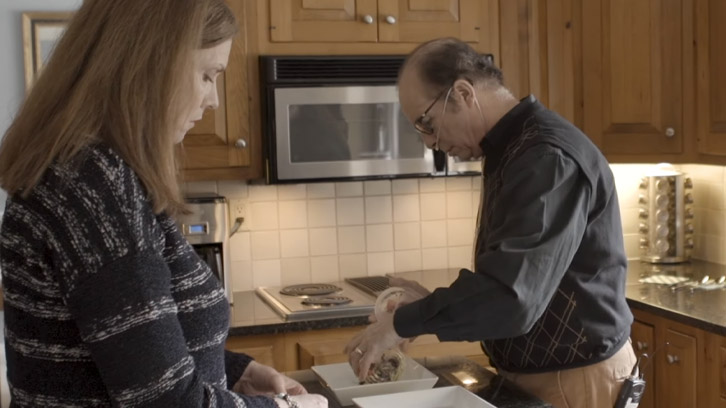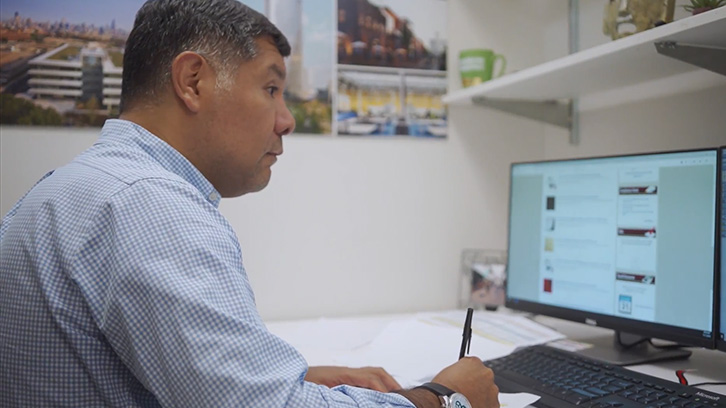For the Caregiver

I am a caregiver for someone with pulmonary fibrosis. What do I need to know?
Whether you are a spouse, partner, child, or friend, caring for someone who is living with a serious illness is a challenge. The role of a caregiver includes two essential responsibilities:
- Do what needs to be done each day to take care of your loved one.
- Take care of yourself. The day-to-day life of a caregiver can be physically and emotionally draining.
The suggestions below may help you be an effective caregiver.
Get the official guide to caregiving for a loved one with PF
It’s rewarding
to be able to support your loved one’s daily needs with compassion and
kindness, but the demands of caregiving can be physically and
emotionally draining. If you’re caring for a patient living with
pulmonary fibrosis (PF), there is information available to help you on
this journey.
The Pulmonary Fibrosis
Foundation's newest resource "Caregiving for a Patient with Pulmonary
Fibrosis: A Guide for Family and Friends" may help you to be a more
effective caregiver while learning how to care for yourself at the same
time. This material can be downloaded or ordered from the PFF Help
Center free of charge.


Take an active role
Be actively involved in your loved one’s medical treatment.
- Participate in your loved one’s diagnostic journey and treatment regimen, which can sometimes be difficult and confusing. Your support may help to alleviate anxiety and frustration for both of you.
- Bring a list of questions that you want to ask your medical team.
- Go to your loved one’s medical appointments and take good notes.
- Be prepared to advocate for the patient if you feel it is necessary.
Know which medications your loved one takes.
- Keep a current list of all medications and supplements.
- Print out copies of the current medication list to hand to medical staff to copy for their records.
Know how to operate any medical equipment used by your loved one.
- Learn how to use a pulse oximeter to check your loved one’s oxygen level and know what their target reading should be.
- Understand how to operate your loved one’s oxygen equipment if they use supplemental oxygen. This can be important in case of an emergency.
- Plan for adequate oxygen when away from home.
Help your loved one maintain a healthy diet and exercise program.
- Speak with your loved one’s physician about their nutritional requirements and help make sure that they are eating a healthy diet.
- See if a pulmonary rehabilitation program is recommended for your loved one to help them maintain muscle tone, which can help with fatigue and breathlessness.
Promote independence
Let your loved one do everything they can for as long as possible.
Don’t take away a pulmonary fibrosis patient’s independence any sooner than necessary, but also be prepared to take over responsibility for things your loved one may no longer be able to do now or in the future, such as:
- Driving
- Ordering and dispensing medications
- Paying bills, managing money, and filing tax returns
- Buying groceries and cooking meals


Take precautions
Help prevent respiratory infections.
- Get a flu vaccine every year. Everyone older than six months of age in the home needs to be vaccinated against influenza every year.
- Make sure you have received a pneumonia vaccine if you are over age 65. Younger adults with certain health conditions may also need to be vaccinated against pneumonia.
- Get vaccinated for COVID-19.
- Wash your hands or use hand sanitizer frequently, especially after returning home.
- Notify your loved one’s primary care provider immediately at the onset of a cold, cough, or flu.
- Keep your loved one away from large crowds.
- Know when to say NO to visits from family or friends; to sitting in a hospital emergency waiting room with sick people; or anything else you feel is unsafe for your patient. You are the best judge of what is okay or not.
Plan for the future
Learn about Advance Directives like Living Wills and Medical Power of Attorney, Physician Orders for Life-Sustaining Therapy (POLST), and palliative care options, long before they seem to be needed.
- Keep these documents where they are safe and easy for you to find. You can also add copies to your loved one’s medical record at the clinic where they receive care.
- Select a person to be the decision maker if you are no longer able to make decisions. Tell that person about your wishes, and those of your loved one with PF, so that they can honor those wishes.
- Learn more at: polst.org and caringinfo.org


Care for yourself
- Ask for help if you need it. Accept help when it is offered.
- Keep up with your own medical appointments.
- Make time for yourself. Get your hair cut, schedule a massage, go to a movie, or have lunch with friends. Participate in activities that reduce stress and promote relaxation.
- Find someone you can talk to when things are hard. You can also join a support group for caregivers.
